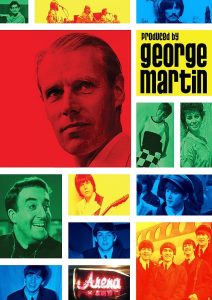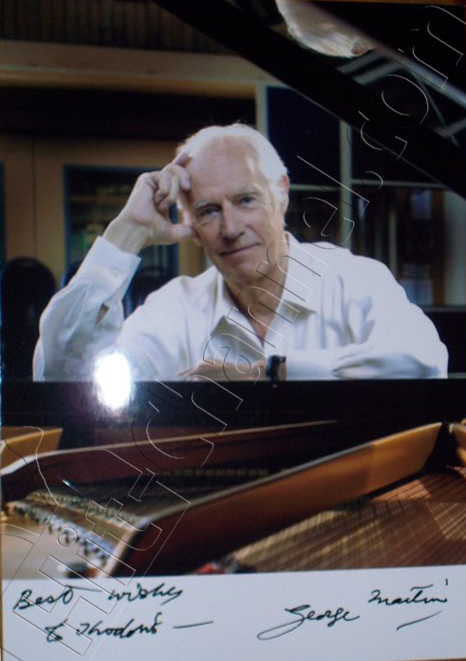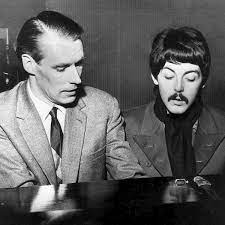HIT CHANNEL EXCLUSIVE INTERVIEW: October 2012. We had the tremendous honour to talk to the greatest record producer of all time: Sir George Martin. He changed forever the history of music with The Beatles, he is the person who established the album format, he introduced classical elements in rock music, he did extremely innovative arrangements and he frequently used non-musical objects in order to expand the musical background of the songs. He has also worked with Jeff Beck, Paul McCartney, Mahavishnu Orchestra, America, Cheap Trick, U.F.O, Cilla Black, Peter Sellers and many others. The excellent documentary about his life and career, “Produced By George Martin”, is now available on DVD. Read below the very interesting things he told us:
 Are you satisfied with the feedback you got so far from fans and press for “Produced By George Martin” documentary?
Are you satisfied with the feedback you got so far from fans and press for “Produced By George Martin” documentary?
Very much so. We have had many super reviews which is most gratifying. It’s always good to know that people have enjoyed what you’ve tried to do, whether that be music, television or film.
Are you flattered when so great musicians and producers, as those who participate in “Produced By George Martin” recognise your huge contribution to modern music?
Of course. I have been incredibly fortunate to have worked with so many major artists and I still wonder when I am going to be found out!
You are the person who established the album format. Some say that the current “death” of the album format is a return to the beginning of the rock ’n’ roll, when singles were more important. Do you share this view?
No, I think the album will always be supreme, but the demise of the record business and the rise of downloading does rather spoil the continuity of a good album.
 What you did with the orchestra in “A Day in the Life” is the most intelligent moment in the history of production. How did you come up with that idea and were you surprised by the reaction of the musicians of the orchestra?
What you did with the orchestra in “A Day in the Life” is the most intelligent moment in the history of production. How did you come up with that idea and were you surprised by the reaction of the musicians of the orchestra?
It was Paul (ed: McCartney) who came up with the basic idea. He described a “musical orgasm” and wanted to assemble a large orchestra to listen to instructions. I had to explain that without a score there would be chaos, so I sat down and worked out on manuscript what I thought was the answer. You know the result.
How much helpful, for you as producer, was the invention of Automatic Double Tracking?
I asked Ken Townsend (who was the best boffin at Abbey Road) how we could achieve tracking without the grind of constant overdubbing. He was brilliant and gave me exactly what I asked for. The secret lay in not just the delay effect of one voice against another (which is what a lot of folk take to be the trick). No, his clever bit was to vary the speed of the undertrack, slightly but randomly, as it was laid behind the master vocal. So it could only be done on replay, never live.
When you started working with The Beatles, they were not very instrumentally capable. As a producer, was it difficult to overcome that factor?
That disparages them. Their guitar work was good, it had to be for their live shows. I have always thought of Paul as a great all-round musician. John (ed: Lennon) could be lazier but they both taught themselves keyboards when they realised their importance.
Did you have a good time working with Jeff Beck for “Blow By Blow” and “Wired” albums? These are the best albums Jeff ever did.
Working with Jeff was a joy. He is such a great guitar player and he makes his instrument sing. He said to me once that his guitar was his voice, which was true. We got on like a house on fire. We spoke of more work together but it never seemed to happen.
 The album with did with UFO, “No Place To Run”, is the “heaviest” album you ever did. Do you like that album today? Were you familiar with that kind of music?
The album with did with UFO, “No Place To Run”, is the “heaviest” album you ever did. Do you like that album today? Were you familiar with that kind of music?
Yes I was familiar, but I did not realise just what it involved. I did not enjoy it much but it seemed to be OK.
Was there any artist or band you would like to produce and didn’t happen?
Lots of people I admire and would like to have recorded, but time is the enemy and I have only one head, one brain and two ears. The latter have now deserted me.
Do you think patience is the greatest skill for a producer?
Yes, it is vital. One has to be a diplomat also to some extent. I try to get my way with big egos by convincing them they had the idea I wanted. It seemed to work.
A huge “THANK YOU” to Sir George Martin and to Mr Adam Sharp for his valuable help.
Please check out www.georgemartinmusic.com

